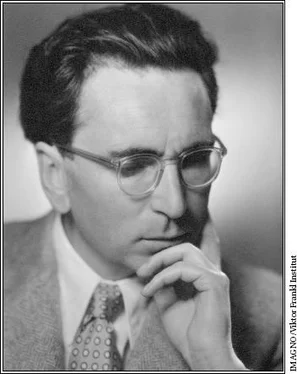And finally I spoke of our sacrifice, which had meaning in every case. It was in the nature of this sacrifice that it should appear to be pointless in the normal world, the world of material success. But in reality our sacrifice did have a meaning. Those of us who had any religious faith, I said frankly, could understand without diffculty. I told them of a comrade who on his arrival in camp had tried to make a pact with Heaven that his suffering and death should save the human being he loved from a painful end. For this man, suffering and death were meaningful; his was a sacrifice of the deepest significance. He did not want to die for nothing. None of us wanted that.
The purpose of my words was to find a full meaning in our life, then and there, in that hut and in that practically hopeless situation. I saw that my efforts had been successful. When the electric bulb flared up again, I saw the miserable figures of my friends limping toward me to thank me with tears in their eyes. But I have to confess here that only too rarely had I the inner strength to make contact with my companions in suffering and that I must have missed many opportunities for doing so.
We now come to the third stage of a prisoner’s mental reactions: the psychology of the prisoner after his liberation. But prior to that we shall consider a question which the psychologist is asked frequently, especially when he has personal knowledge of these matters: What can you tell us about the psychological make-up of the camp guards? How is it possible that men of flesh and blood could treat others as so many prisoners say they have been treated? Having once heard these accounts and having come to believe that these things did happen, one is bound to ask how, psychologically, they could happen. To answer this question without going into great detail, a few things must be pointed out:
First, among the guards there were some sadists, sadists in the purest clinical sense.
Second, these sadists were always selected when a really severe detachment of guards was needed.
There was great joy at our work site when we had permission to warm ourselves for a few minutes (after two hours of work in the bitter frost) in front of a little stove which was fed with twigs and scraps of wood. But there were always some foremen who found a great pleasure in taking this comfort from us. How clearly their faces reflected this pleasure when they not only forbade us to stand there but turned over the stove and dumped its lovely fire into the snow! When the SS took a dislike to a person, there was always some special man in their ranks known to have a passion for, and to be highly specialized in, sadistic torture, to whom the unfortunate prisoner was sent.
Third, the feelings of the majority of the guards had been dulled by the number of years in which, in ever-increasing doses, they had witnessed the brutal methods of the camp. These morally and mentally hardened men at least refused to take active part in sadistic measures. But they did not prevent others from carrying them out.
Fourth, it must be stated that even among the guards there were some who took pity on us. I shall only mention the commander of the camp from which I was liberated. It was found after the liberation—only the camp doctor, a prisoner himself, had known of it previously—that this man had paid no small sum of money from his own pocket in order to purchase medicines for his prisoners from the nearest market town. 1But the senior camp warden, a prisoner himself, was harder than any of the SS guards. He beat the other prisoners at every slightest opportunity, while the camp commander, to my knowledge, never once lifted his hand against any of us.
It is apparent that the mere knowledge that a man was either a camp guard or a prisoner tells us almost nothing. Human kindness can be found in all groups, even those which as a whole it would be easy to condemn. The boundaries between groups overlapped and we must not try to simplify matters by saying that these men were angels and those were devils. Certainly, it was a considerable achievement for a guard or foreman to be kind to the prisoners in spite of all the camp’s influences, and, on the other hand, the baseness of a prisoner who treated his own companions badly was exceptionally contemptible. Obviously the prisoners found the lack of character in such men especially upsetting, while they were profoundly moved by the smallest kindness received from any of the guards. I remember how one day a foreman secretly gave me a piece of bread which I knew he must have saved from his breakfast ration. It was far more than the small piece of bread which moved me to tears at that time. It was the human “something” which this man also gave to me—the word and look which accompanied the gift.
From all this we may learn that there are two races of men in this world, but only these two—the “race” of the decent man and the “race” of the indecent man. Both are found everywhere; they penetrate into all groups of society. No group consists entirely of decent or indecent people. In this sense, no group is of “pure race”—and therefore one occasionally found a decent fellow among the camp guards.
Life in a concentration camp tore open the human soul and exposed its depths. Is it surprising that in those depths we again found only human qualities which in their very nature were a mixture of good and evil? The rift dividing good from evil, which goes through all human beings, reaches into the lowest depths and becomes apparent even on the bottom of the abyss which is laid open by the concentration camp.
And now to the last chapter in the psychology of a concentration camp—the psychology of the prisoner who has been released. In describing the experiences of liberation, which naturally must be personal, we shall pick up the threads of that part of our narrative which told of the morning when the white flag was hoisted above the camp gates after days of high tension. This state of inner suspense was followed by total relaxation. But it would be quite wrong to think that we went mad with joy. What, then, did happen?
With tired steps we prisoners dragged ourselves to the camp gates. Timidly we looked around and glanced at each other questioningly. Then we ventured a few steps out of camp. This time no orders were shouted at us, nor was there any need to duck quickly to avoid a blow or kick. Oh no! This time the guards offered us cigarettes! We hardly recognized them at first; they had hurriedly changed into civilian clothes. We walked slowly along the road leading from the camp. Soon our legs hurt and threatened to buckle. But we limped on; we wanted to see the camp’s surroundings for the first time with the eyes of free men. “Freedom”—we repeated to ourselves, and yet we could not grasp it. We had said this word so often during all the years we dreamed about it, that it had lost its meaning. Its reality did not penetrate into our consciousness; we could not grasp the fact that freedom was ours.
We came to meadows full of flowers. We saw and realized that they were there, but we had no feelings about them. The first spark of joy came when we saw a rooster with a tail of multicolored feathers. But it remained only a spark; we did not yet belong to this world.
In the evening when we all met again in our hut, one said secretly to the other, “Tell me, were you pleased today?”
And the other replied, feeling ashamed as he did not know that we all felt similarly, “Truthfully, no!” We had literally lost the ability to feel pleased and had to relearn it slowly.
Psychologically, what was happening to the liberated prisoners could be called “depersonalization.” Everything appeared unreal, unlikely, as in a dream. We could not believe it was true. How often in the past years had we been deceived by dreams! We dreamt that the day of liberation had come, that we had been set free, had returned home, greeted our friends, embraced our wives, sat down at the table and started to tell of all the things we had gone through—even of how we had often seen the day of liberation in our dreams. And then— a whistle shrilled in our ears, the signal to get up, and our dreams of freedom came to an end. And now the dream had come true. But could we truly believe in it?
Читать дальше












